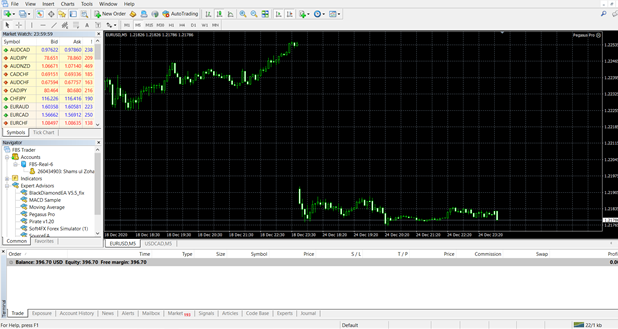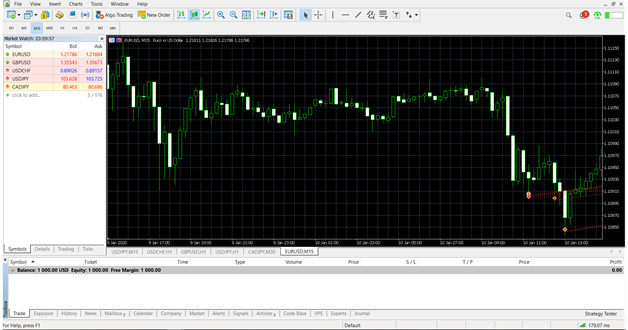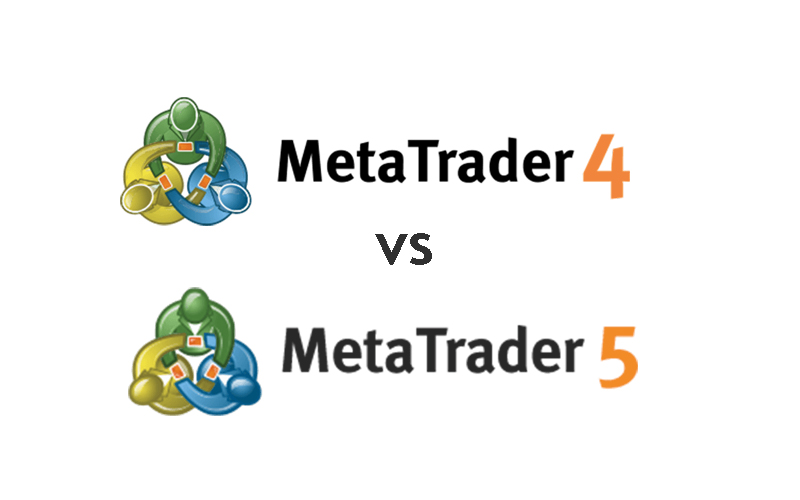Trading Platforms: Introduction
A trading platform provides a means through which traders can open or close their trades or manage them. Depending on the type of trader you are, you may receive trading software through your broker or a prop firm that they develop specifically for their people. Besides supervising your trades, these platforms also come with additional features like charts, a news feed, real-time quotes, charting tools, support, etc. We can determine the advantages and caliber of each by looking at the number of features alongside execution, access to routes, and stability.
MetaTrader Trading Platforms
Developed by a third-party trading company MetaQuotes, MetaTrader 4 and 5 are among the favorite choices of traders. Most brokers nowadays have their own trading system, but they make sure to provide both MetaTrader versions. A vast number of robots and indicators are coded to run specifically on these, and new ones can also be created from within the software. MT5 is the latest version, made after specific tweaks in the fourth one. However, MT4 remains the top choice as a trading platform by most brokers and traders alike.
MetaTrader 4
Let us shed some light on MT4 first, as it’s one of the oldest and most famous platforms out there. Released in 2005, it has various benefits for traders that consist of forex and futures trading, analyze financial markets, running trading robots, and copy trading. Different strategies can be employed using the three execution modes, i.e., instant execution, stop loss, and trailing stop. One-click trading is a handy feature when it comes to day trading or scalping.
MT4 allows you to do your technical analysis comprehensively. Each symbol can be opened in 9 different time frames, beneficial for looking at price fluctuations from various perspectives. For even further observation, one can employ 30 built-in technical indicators and 24 graphic objects. Your trading accounts are well protected with the software as it has the highest security standards. Data exchange is encrypted, and the platform also has support for RSA digital signatures. Web and mobile trading are supported. The software is developed using MetaQuotes language 4, which is based on the famous C++. The employed language’s flexibility is handy while making a robot, indicator, script, and a library.

Image 1: The basic interface of MT4 trading software
MetaTrader 5
MT5 is a multi-asset platform through which you can trade on forex, exchange instruments, and futures. It can be stated as a more advanced and refined version of its predecessor, MT4. The platform is compelling when it comes to executing your positions. MetaTrader 5 has an advanced market depth feature, support for all types of order and execution modes. Two available order accounting modes are:
- Netting mode for exchange markets
- Hedging method for forex trading
Up to 21-time frames are provided to analyze a currency pair with the added benefit to open 100 charts on the platform simultaneously. Over 80 built-in indicators are also available, with the possibility to download even more. Having all the exceptional tools at the tip of your finger is undoubtedly beneficial for accurate market predictions.
Fundamental news corner has information on all critical financial events and also comes with an economic calendar. Web and mobile trading apps are at one’s disposal. Both have high versatility and maximum data protection. MQL5 Wizard for algorithmic trading is handy for beginners to develop a forex robot, while pros can get their hands on the advanced MQL5 IDE. Strategy tester can test your multi-currency expert advisors that correlate between two currencies.

Image 2: The basic interface of MT5 trading software
MT4 vs. MT5 Similarities
The range of similarities between the two is not wide enough. The basic principles and components for choosing a platform are trade executions, available indicators, charts, time frames, support for algorithmic trading, solutions for mobile and web, security, programming language, order types, and many more. For our comparison, we can find the following identical features offered by both trading platforms:
- Both MT4/5 are automated trading systems that require you to open an account with a broker before you place an order and start trading
- Hedging is allowed on MetaTrader 4 and 5
- Desktop, mobile, and web applications are available with both platforms
- Security is held at its utmost level as the two platforms use encrypted data exchange
MT4 vs. MT5 Differences
One can argue that the number of differences between the two is significant. This is apparent as MT5 came out five years later in 2010 and has certain modifications and additions that make it much better.
- Language gives the first contrast as MT4 has MQL4 and MT5 has MQL 5
- Depth of market is available only on MetaTrader 5
- The number of time frames on MT5 is 21 compared to only 9 on MT4
- Six different types of pending orders are accessible with MT5, whereas MT4 has only four
- Netting is allowed on the latest version, while the former only support hedging
- The number of technical indicators is 38 on Metatrader 5, which is 8 more than the one on the fourth version
- An economic calendar can be accessed directly with the help of MT5, whereas this feature is not provided on MetaTrader 4
- The interface of MT4 is much simpler to use compared with MT5. It may be said that the first version is catered more towards the needs of a beginner trader while professionals can use MetaTrader 5 as their first choice
- Strategy tester on MetaTrader five is more advanced as it is multi-threaded and can run backtests for trading robots that use currency correlations
End of Line: Which One Is Best for You?
Some may argue that MetaTrader 5 is not an update to the fourth version; instead, it is an entirely new platform with its own qualities. The number of differences and better features by MT5 may compel you to get the latest one. Considering that the two platforms serve their purposes and are therefore more suited to a specific audience, it is hard to say which may be best for you. In the end, it really boils down to personal preference.
